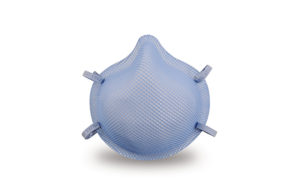
An N95 mask made by Moldex. (Image courtesy of Moldex)
The FDA today removed N95 respirators from its medical device shortage list.
The agency credited increased domestic manufacturing of the face masks, new supply chain data from the industry and federal government, and approval from the Centers for Disease Control and Prevention’s National Institute for Occupational Safety and Health (NIOSH) of new disposable N95s and reusable respirators.
The FDA did not announce any new additions to the device shortage list, but added two brands of needles and syringes (product code GAA) and two brands of viral transport media (product codes QMC and JSM) to its device discontinuance list.
Respirators were one of the first medical devices identified in critically short supply in the pandemic as many health care workers treated patients without sufficient personal protective equipment like masks, gowns and gloves. The FDA said its removal of N95 respirators from the shortage list does not impact its pandemic enforcement policy for face masks, barrier face coverings, face shields, surgical masks and respirators.
PREVIOUSLY: 3M, others may have unmasked a solution to future N95 shortages
“Throughout the COVID-19 pandemic, one of the FDA’s top priorities has been to ensure frontline health care workers have access to the critical protections they need,” Suzanne Schwartz, director of the FDA’s Center for Devices and Radiological Health’s Office of Strategic Partnerships and Technology Innovation, said in a news release.
“We have worked very closely with our partners at NIOSH, the Occupational Safety and Health Administration and with U.S. manufacturers to stabilize, rebuild and secure health care access to high-quality, single-use respirators, including those that are American-made,” Schwartz continued. “Today, our national capacity for production of these devices is stronger and our supply chain is more resilient because of these collective efforts on behalf of the dedicated people working to save lives.”
The FDA weighs both supply and demand in its medical device shortage assessments. The CDC earlier this year loosened its mask guidance and no longer requires masking on aircraft or trains, leaving airlines, Amtrak, employers and state and local governments to set their own policies.
Masking is one of the most effective ways to prevent COVID-19 infection and transmission as new SARS-CoV-2 variants show increased ability to evade immunity from past infections and vaccination.
RELATED: FDA issues new COVID-19 testing guidance to avoid false negatives